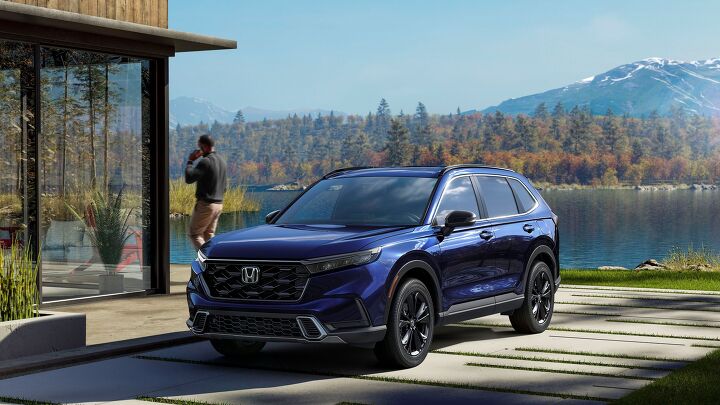Honda Plans a U.S.-Built Hydrogen Fuel Cell CR-V in 2024

There are only two hydrogen fuel-cell vehicles (FCEV) on sale today. One is sold by Hyundai, and the other by Toyota. Honda sold one for several years until 2021 when it discontinued the Clarity FCEV. The automaker now says it plans to develop a hydrogen-powered CR-V for the U.S. market and promises a launch by the end of 2024.
The CR-V will be built at Honda’s factory in Ohio, using the FCEV system the automaker partnered with General Motors to develop. It’s significantly less expensive than the system Honda used in the Clarity, is more durable, and offers better performance in cold weather.
Hydrogen and other alternative fuels are not as common as electric vehicles, hybrids, and plug-in hybrids, but many view them as vital tools to reach the goal of zero emissions. Toyota and its outgoing CEO Akio Toyoda have been vocal proponents of exploring all possibilities when it comes to reducing global vehicle emissions. However, its approach also includes a heavy emphasis on hybrid and PHEV technologies.
California is the epicenter of hydrogen fueling in the United States, but the Alternative Fuels Data Center notes a planned expansion into the states in the northeast. However, that will still leave hydrogen far behind electric vehicles until fueling stations can catch up. The AFDC notes that hydrogen fueling stations could build on existing gas stations, which could help hasten the expansion.
[Image: Honda]
Become a TTAC insider. Get the latest news, features, TTAC takes, and everything else that gets to the truth about cars first by subscribing to our newsletter.

Chris grew up in, under, and around cars, but took the long way around to becoming an automotive writer. After a career in technology consulting and a trip through business school, Chris began writing about the automotive industry as a way to reconnect with his passion and get behind the wheel of a new car every week. He focuses on taking complex industry stories and making them digestible by any reader. Just don’t expect him to stay away from high-mileage Porsches.
More by Chris Teague


































Comments
Join the conversation
Cool.
(ToolGuy supports technology advancement, as well as third-person references)
I like hydrogen cars. Small batteries, quick refueling. But they need a bigger splash in commercial long haul trucking for this to be viable in the US in the long run. Packaging those tanks is less of an issue on a truck than on a car. That and coastal cities willing to build out refilling stations, H is a tough sell.
I'm still a fan. It gets away from the downsides of EVs - recycling, costs, weight, refilling times - but needs to address the fun to drive nature of what EVs do.
Storing and transporting H2 at one atmosphere and room temperature are the major issues. Fuel cells and electric motors are mature technology. Honda sure as heck knows how to build cars. Plants have been splitting out hydrogen atoms from water for 3.5 billion years, so I'm confident a more efficient, scalable H2 production can be teased out. I don't see the physics of the smallest molecule changing. Plants add carbon to hydrogen store it. Regenerative braking would require big capacitors and/or batteries anyway. I don't see a way forward.
Dear Honda: Please don't flush your last money into the sewer. This pathway was always a red herring; something pretend to give concerned people false confidence about the future. It was never a viable option, now or in the past. This desperate act to make a false promise real, can only hurt you financially.